The Lone Runner Blog Series: Even Marathoners Need Speedwork
Even Marathoners Need Speedwork
by Ben Connelly
In this article, I’d like to introduce a topic I plan to explore over multiple articles. Today, I will explain why even runners training for marathons should run fast workouts. In later articles, I will provide specific workout suggestions and go deeper into the science behind them.
Many marathon runners believe they do not need to run any workouts faster than their goal marathon race pace during training. Some believe they never need to run faster than their easy pace. If your only goal is completing the marathon, you may be correct that you do not need to run fast during training. But if you want to improve your marathon race time, you should incorporate some speedwork into your training.
Some runners even seem to think that running fast workouts will hurt their marathon race times. Perhaps they believe that developing the fast twitch muscle fibers in their legs will crowd out their slow twitch muscle fibers. Or that speed inversely correlates with endurance.
In reality, speed does not detract from endurance (except in extreme cases). In fact, sprinting speed can at some level predict marathon race times. Furthermore, the same physiological variables that determine performance at shorter distances (VO2 Max, lactate threshold, running economy), still heavily determine outcomes in the marathon. Improving both VO2 Max and lactate threshold will improve your marathon performance.
In fact, some of the most critical workouts in marathon training will stress your lactate threshold. Most serious marathon training plans include a fair amount of tempo (lactate threshold) training. Additionally, marathoners should also run some workouts designed to stress their VO2 Max, including intervals on the track. While marathoners definitely need to run workouts more specific to their race, they will benefit from 1000m and 1200m intervals at 5k pace.
Also, runners training for marathons need to perform hill workouts. Especially runners training for the San Francisco Marathon. These workouts should include a mix of shorter hill sprints, longer endurance efforts, hills run at goal marathon race pace, and some tempo-paced hill workouts.
Runners training for a marathon will still need to focus heavily on slow, easy miles when building their mileage base. They need to run long runs. They should spend a fair amount of time running at their goal marathon race pace, especially during long runs, in order to improve running economy at that pace. And during shorter recovery runs, they should run as slow as necessary in order to fully recover from harder workouts. But they should not neglect faster workouts that stress their lactate threshold and VO2 Max.
The best training for any race distance will include some slower mileage, some fast workouts, and some workouts specific to the goal race. Almost every serious plan will include workouts that stress lactate threshold, VO2 Max, and endurance.
The same principles underpin much of endurance running. While marathon training should look different from 800m training, both types of training have the same roots. Success in both distances (and every distance in between), still depends on the same physiological variables. Therefore, even marathoners need to run some faster workouts (sometimes even on the track).
Ben Connelly is a freelance writer and an experienced runner. He has written multiple e-books on running and general fitness, including a marathon training guide, which you can purchase here. You can find him at his Amazon Author page, or at his website.


